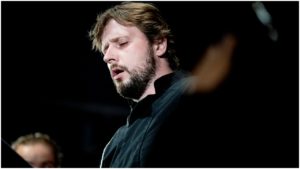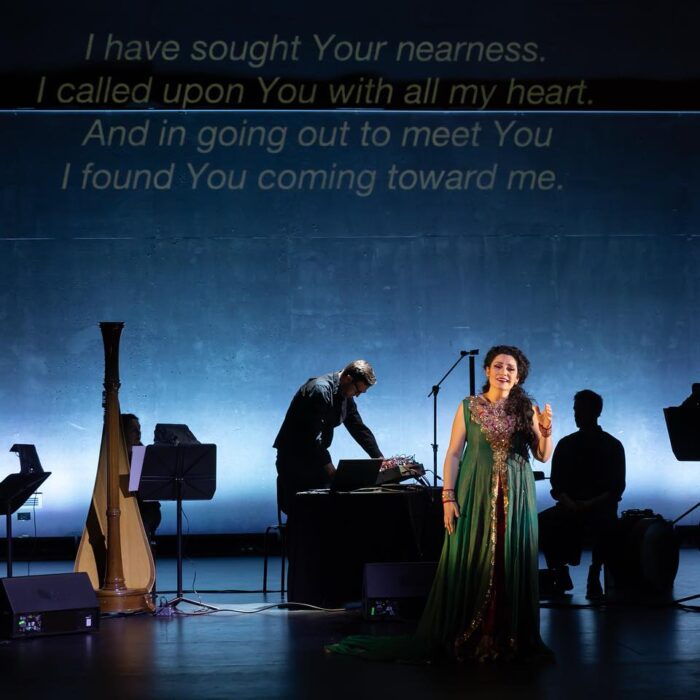
The Xen of Opera: The Art of Moving Above The Ground
By Xenia Hanusiak(Credit: Liv Øvland)
Opera is quivering, twisting, and turning. Could it be that we are in an opera renaissance? There is a new blood pulsing through its veins. Opera and theater makers are pulling at its heart, resuscitating our interest and taking us to diverse locations with as yet unclassifiable languages and forms. The Xen of Opera looks at the protagonists and projects that are moving the needle of opera and song. It is a monthly column that takes readers far and wide beyond the proscenium arch and writes about the influencers who are rewriting opera’s narrative across the globe. There is no prescription to its content: sometimes a snap shot, sometimes an idea, sometimes an observation, but always the song.
The Xen of Opera has been missing in action as I have been immersed as a critic at the extraordinary Critic’s Institute at the Eugene O’Neill Theater Center taking in the most innovative theatre America offers. This month the Xen of Opera travels to Norway to discover the secrets of song at the Rosendal Chamber Music Festival and the Queen Sonja International Music Competition.
Estonian mystic composer Arvo Pärt once confided to Finnish conductor Esa-Pekka Salonen. He said, “the creative centre is the heart not the head. This is the secret which great singers have. They are not stepping from one place to another, they’re moving a little above the ground.”
Truth
At Leif Ove Andsnes’s astonishing fourth Rosendal Chamber Music Festival in the picturesque Barionet Rosendal of the western Fjord district of Norway’s Hardanger, two singers swept the audience stratospherically above the earth. They are the Ukrainian baritone Andrei Bondarenko and French tenor Christophe Poncet de Solages. Yes, both singers transported us with their fully engaged, emotionally profundity but more expressly and more importantly both artists gave us what most singers rarely can achieve and that is, the ability to deliver truth.
Truth? Truth is having its fare share of attention. In a decade where societies across the globe are questioning the veracity of truth throughout the media it is a relief to find this precious virtue on the musical stage.
It may seem as the most fundamental request but in general terms, the value of truth and the priority to text still figures far too ordinarily in current operatic interpretations where the over-emphasis on vocal sound still clings to the dictums of Bel Canto. We suffer from a surfeit of character.
As a matter of happenstance–via this festival’s comprehensive program–a prescient note from Shostakovich echoed my earlier conclusions. In his comments regarding the future success of his student Galina Ustvolskaya, Shostakovich remarked that this composer would be ‘valued by all who hold truth to the essential element of music.’ Ustvolskaya’s career flourishes.
This maxim is important. It also reflects Andsnes’s distinctive and detailed directorial diligence resonating loudly not just through the vocal component but throughout the festival.
Each year Andsnes’s vision is built on a thematic premise. His previous editions celebrated Schubert, then Mozart. Last year, the festival probed the music through the period of World War I.
Shostakovich
In 2019 his curatorial vision paints a sonic biography of Shostakovich’s distinctive opus from solo repertoire and chamber music to his film scores. The intention also includes an exploration of the work of composers orbiting in and after Shostakovich’s time-Stravinsky, Schnittke, Prokofiev, Silvestrov, and Denisov were all considered.
For audiences and for Bondarenko, the festival’s comprehensive purview offered the opportunity to hear the rarely performed Mussorgsky’s Songs and Dances of Death in the opening concert and two Shostakovich cycles based on Pushkin’s poetry¬–the Monologues Opus 91 and the Four Romances the following evening.
In this, my first opportunity to hear the Bondarenko, it is easy to see from his two Rosendal performances why he was chosen as the 2011 BBC Cardiff Singer of the World Competition. Furthermore, his musicianship, effortlessly nuanced legato and elegant timbre makes him a most likely contender to fill the shoes of the late Dmitri Hvorotovsky.
In his depictions of death in Mussorgsky’s four-song cycle Bondarenko was powerful without being pompous, thoughtful without being introspective. At never any point did he direct us to his voice, but rather to what his voice was telling us – and always through his perspective as a millennial man, thereby creating an experience composed in the past but relatable in the present. This is musical contemporary story telling.
The partnership with Andsnes as accompanist was incomparable. The two performers seamlessly dovetailed the others tone and phrasing with singular intention. With the two Shostakovich pieces, the performances were a little more studied–Bondarenko was more dependent on his score. For the audience the programming juxtaposition of the two cycles offered a fascinating insight into an almost twenty-year trajectory of Shostakovich’s developing style. Shostakovich’s interest in Pushkin’s poetry began in 1936 with the settings of four poems in the Romances.
He returned to Pushkin in the monologues in 1952, co-incidentally in the year of Stalin’s death. The monologues develop Shostakovich’s musical imprimatur of his signature DSCH and travel through a musical landscape evoking the tolling of church bells. Accompanied by the quixotic Armenian pianist Marianna Shirinyan, Bondarenko offered a stoic and reserved sound. In the Four Romances with Norway’s lithe and attentive Ensemble Allegria, the baritone’s summoned reedy qualities to convey the messages.
Zaitsev’s Letter
In this festival, artist-in-residence Russian composer Alexander Vustin –described by in house musicologist and charming raconteur Gerard McBurney as the most important composer in Russia today –presented his most compelling work in the opening concert.
Written in 1990, Zaitsev’s Letter –a chamber work for string ensemble and narrator sets as its text a published letter to the editor by a twenty-old Russian prisoner describing the conditions in his country’s penal system. With resonances of various records of mass incarceration and immigration casting a contemporary shadow this performance was gifted by the recitation by French tenor Christophe Poncet de Solages.
Poncet de Solages did not sing per se and remarkably learnt Russian at high school, but the visceral rhythmic vitality of his interpretation through Sprechstimme and half sung phrases shot through the air with a searing direction aimed straight to our hearts. Poncet de Solanges’s interpretation was a stratigraphic excavation of the thoughts of the distressed prisoner. Theatrical music making of this standard does not get more compelling.
Like Bondarenko, Poncet de Solages took us to the place Pärt so aptly seeks – a heart to heart connection that takes us a little above the ground. In this case, the earth rattled.
In this four-day festival in the small town of Rosendal of the Hardanger Fjord, Andsnes builds his festival in the concert venue of Barionet Rosendal, a 1655 Manor House and Garden. Cradled by towering mountains, waterfalls, and streams with the scents of a rose garden and fir trees filling the air, the Rosendal Chamber Music Festival is set to become one of the must attend festivals of the European summer.
Categories
Special Features

